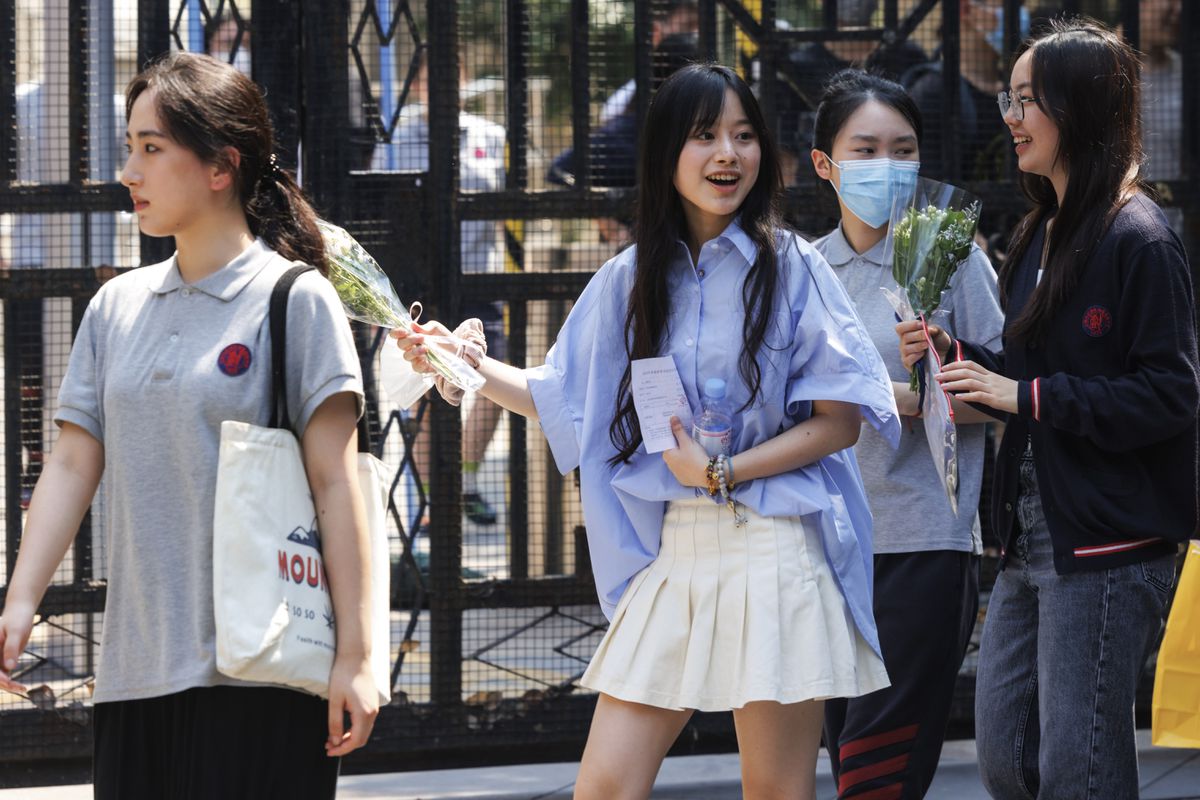A total of 12.91 million Chinese students are playing from Wednesday their future in the gaokao, the equivalent of the Selectivity in the Asian giant. The demanding university entrance exam, which this year has registered a record number of enrollments, is considered the most pressured in the world, not so much because of the difficulty of the questions, but because of what is on the table: for many young people, especially those from rural or disadvantaged backgrounds, it is the only option to earn a ticket to enter one of the most prestigious universities in the country. which has traditionally been considered the key to a virtually guaranteed future.
At a time when China is slowly recovering from three years of intense fighting against COVID-19, and when the urban youth unemployment figure is at an all-time high (20.4% in April, according to the National Bureau of Statistics), the pressure to obtain a score close to 750 (the highest score) has become even greater than in previous editions. The increase in the number of candidates (980,000 more than in 2022, according to the Ministry of Education) for so few places (it is estimated that there will be less than five million) increases uncertainty among a generation that has grown up amid the economic prosperity brought by the country's vertiginous development in the last two decades.
The tests, which extend until Saturday in some provinces, will also be the most monitored to date to prevent fraud. Since 2016, copying in the gaokao is a crime included in the Penal Code and punishable by up to seven years in prison. The education and public security authorities have warned that a special operation of "zero tolerance" has been launched towards cheating in the exam and, according to the Global Times newspaper, many centers have reinforced controls by installing facial recognition systems and smart cameras to detect electronic devices (such as phones, electronic watches, pinganillos or microphones).
A preparation of 11 hours a day for 4 years
This noon, at the gate of Beijing Institute 17, Ning Jing runs to her mother, who is waiting for her holding a bouquet of flowers. "It went well, it was easier than the models," exclaims the teenager after finishing the first exam of the day, the Chinese exam. Ning Jing says he has spent about 11 hours a day for the past four years preparing for gaokao. Like other of his colleagues interviewed, the only thing that is clear is that he aspires to enter Tsinghua or Beida (Peking University). "It's very difficult, but you have to try," he says with determination. The specialty, in his opinion, is secondary.
Having higher education is a source of social pride and, being mostly only children due to the birth containment policy that governed in China between 1980 and 2015, on their shoulders are placed the hopes of their relatives. So much so that many parents spend hundreds of euros a month in expensive extracurricular training schools from a very early age, a practice so widespread that it has become one of the main arguments that many couples wield for not having offspring, not being able to afford it economically. In order to reduce inequality – and encourage the birth rate – the Government banned in 2021 private classes of compulsory subjects in the curriculum from primary to secondary.
"I would like him to study medicine, but he wants to do something related to video games or sports management," says Ms. Gao, dressed in an elegant red qipao, a traditional costume with which she hopes to attract good luck for her son. "He's done what he can. Studying all these years from home has had negative consequences for her routine," she shares with regret. The examinees have completed most of the baccalaureate under strict anti-covid restrictions, which ended abruptly in December. "I think he's spent more time looking at Douyin [the Chinese version of TikTok] than a book. I don't know if he can stay in Beijing," he mutters under his breath.
The current generation of young Chinese is the most prepared in decades, with unprecedented figures in the number of university graduates and higher education cycles. Their expectations, however, are frustrated in a labor market that offers fewer opportunities after lockdowns during the pandemic. The private sector, which generates more than 80% of jobs in China, has also been hurt in recent years by a regulatory campaign against the real estate, technology and education sectors. The pressure will increase this summer, when a record 11.58 million college graduates are expected.
According to a report by the Ministry of Education published in March, 5.46 million people started a vocational degree in 2022, above the 4.67 million who started a university career. In recent months, young people have been urged from the top to put aside their career ambitions and devote themselves to manual work. President Xi Jinping himself called in an article published on the front page of the People's Daily on the occasion of Youth Day (May 4) to learn to "persevere in the face of adversity", and state media have increased the frequency with which they publish stories about young people who make a good living as delivery boys. shopkeepers, fishermen or farmers.
You can follow EL PAÍS EDUCACIÓN onFacebook and Twitter, or sign up here to receive our weekly newsletter.
Subscribe to continue reading
Read without limits
Read more
I'm already a subscriber









